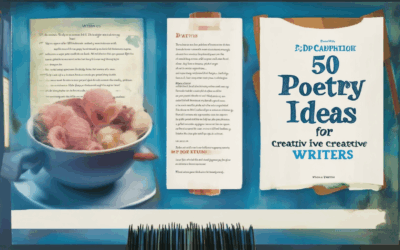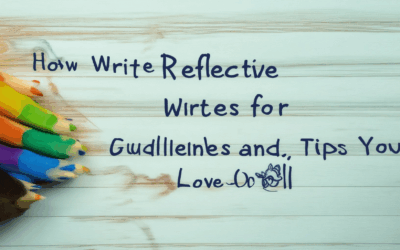Are you passionate about refining your poetry skills? Improving your poetry writing can lead to profound personal growth and creative expression. Whether you’re a seasoned poet or just beginning, mastering the art of poetry requires dedication, practice, and a willingness to learn from experts. In this guide, we’ll explore effective strategies to enhance your poetry writing, uncover the key elements that make poetry compelling, and provide actionable insights to help you craft memorable verses. From daily writing habits to revising techniques, and from leveraging imagery to understanding rhythm, we’ll cover everything you need to know to elevate your poetry. Let’s dive in and discover how to unlock your full potential as a poet.
Key Takeaways
– Harness Creativity: Embrace experimentation to find your unique poetry style.
– Learn from Masters: Study established poets to master rhythm and imagery.
– Build Consistency: Develop a daily writing routine for sustained growth.
– Refine Your Work: Edit thoughtfully to enhance clarity and emotional impact.
– Seek Feedback: Use constructive criticism to identify areas for improvement.
– Explore Diverse Themes: Write about varied subjects to keep your work fresh.
– Engage with the World: Use sensory details inspired by your surroundings.
– Cultivate a Growth Mindset: Stay open to learning and evolving as a poet.
– Maintain a Regular Practice: Consistency is key to unlocking creativity.
These takeaways encapsulate the essential strategies and elements that elevate poetry writing, offering actionable insights for readers seeking to enhance their craft.

Effective Strategies to Improve Your Poetry Writing
Writing poetry can be a deeply personal and rewarding process, but it’s also an art that requires practice, patience, and a willingness to evolve. Here are some proven strategies to help you enhance your poetry skills:
- Embrace Creativity and Experimentation
- Study the Masters
- Develop a Daily Practice
- Edit and Revise Thoughtfully
- Seek Feedback and Constructive Criticism
- Explore Different Themes and Subjects
- Engage with the World Around You
- Practice the Art of Description
- Stay Open to Learning and Growth
Don’t fear failure. Poetry is a medium that thrives on uniqueness and individuality. Experiment with different structures, meters, and themes to find your personal style. Whether it’s free verse, haiku, sonnets, or abecedarians, exploration is key to growth.
Read widely and deeply. Immerse yourself in the works of established poets to understand the nuances of rhythm, imagery, and emotional resonance. Pay attention to how they convey meaning through language and form.
Consistency is crucial. Dedicate time each day to write, even if it’s just a few lines. This routine helps build muscle memory and keeps your creative juices flowing. Over time, you’ll notice your language becoming more precise and your ideas more vivid.
Don’t be afraid to revisit your work. Editing is not about erasing your initial vision but refining it. Look for ways to tighten your language, eliminate redundancies, and enhance the emotional impact. Sometimes, a poem needs a little pruning or a fresh perspective to reach its full potential.
Share your poetry with trusted friends, mentors, or writing groups. Their insights can offer perspectives you might not have considered. Use feedback as a tool for growth, not as a measure of your self-worth. Every poem is a step toward understanding your craft.
Don’t limit yourself to a single theme or subject. Allow your curiosity to guide you. Write about love, loss, nature, identity, or whatever captures your imagination. Broadening your horizons will keep your work fresh and engaging.
Look closely at the world. Observe the details of everyday life—the way light changes, the sounds of a city, the quiet moments that often go unnoticed. These observations can inspire vivid imagery and deeper storytelling in your poetry.
Use your senses to paint pictures with words. Describe what you see, hear, feel, taste, and smell. The more sensory-rich your language, the more immersive your poetry will be for readers.
Poetry is a lifelong journey. Stay open to learning new techniques, exploring different styles, and embracing change. The best poets are those who continually challenge themselves and evolve over time.
Remember, every poem is a step forward. Keep experimenting, keep reading, and keep writing. With dedication and passion, your poetry will continue to grow and flourish.
Discover more resources to enhance your poetry writing on Silken Drum.
What Are the Key Elements That Make Poetry Compelling?
Here are the key elements that make poetry compelling:
- Vivid Imagery : Poets use descriptive language to paint pictures in the reader’s mind, creating strong sensory experiences.
- Emotional Depth : Poetry often explores complex emotions, resonating with readers on a personal level.
- Rhythm and Flow : The musicality of words and the cadence of sentences contribute to the poetic experience.
- Theme and Symbolism : A cohesive theme or meaningful symbols elevate the poem, giving it layers of meaning.
- Unique Voice : A distinctive style or perspective sets the poet apart and captures attention.
- Connectivity Between Lines : Each line builds upon the last, creating a narrative or emotional arc.
- Simplicity and Elegance : economy of language and precise wording enhance the poem’s impact.
- Personal Connection : When a poet shares genuine feelings or experiences, readers feel understood and engaged.
- Cultural or Historical Context : poems that reflect cultural heritage or historical events gain significance.
- Novelty and Innovation : experimenting with form or structure keeps poetry fresh and exciting.
Explore more poetry insights and tips on Silken Drum , where writers and readers connect through creative expression. Discover how rhythm, themes, and emotional depth can transform your poetry.

What Are the Key Elements That Make Poetry Compelling?
Here are the key elements that make poetry compelling:
- Vivid Imagery : Poets use descriptive language to paint pictures in the reader’s mind, creating strong sensory experiences.
- Emotional Depth : Poetry often explores complex emotions, resonating with readers on a personal level.
- Rhythm and Flow : The musicality of words and the cadence of sentences contribute to the poetic experience.
- Theme and Symbolism : A cohesive theme or meaningful symbols elevate the poem, giving it layers of meaning.
- Unique Voice : A distinctive style or perspective sets the poet apart and captures attention.
- Connectivity Between Lines : Each line builds upon the last, creating a narrative or emotional arc.
- Simplicity and Elegance : economy of language and precise wording enhance the poem’s impact.
- Personal Connection : When a poet shares genuine feelings or experiences, readers feel understood and engaged.
- Cultural or Historical Context : poems that reflect cultural heritage or historical events gain significance.
- Novelty and Innovation : experimenting with form or structure keeps poetry fresh and exciting.
Explore more poetry insights and tips on Silken Drum , where writers and readers connect through creative expression. Discover how rhythm, themes, and emotional depth can transform your poetry.

Effective Strategies to Improve Your Poetry Writing
Writing poetry can be a deeply personal and rewarding process, but it’s also an art that requires practice, patience, and a willingness to evolve. Here are some proven strategies to help you enhance your poetry skills:
- Embrace Creativity and Experimentation
- Study the Masters
- Develop a Daily Practice
- Edit and Revise Thoughtfully
- Seek Feedback and Constructive Criticism
- Explore Different Themes and Subjects
- Engage with the World Around You
- Practice the Art of Description
- Stay Open to Learning and Growth
Don’t fear failure. Poetry is a medium that thrives on uniqueness and individuality. Experiment with different structures, meters, and themes to find your personal style. Whether it’s free verse, haiku, sonnets, or abecedarians, exploration is key to growth.
Read widely and deeply. Immerse yourself in the works of established poets to understand the nuances of rhythm, imagery, and emotional resonance. Pay attention to how they convey meaning through language and form.
Consistency is crucial. Dedicate time each day to write, even if it’s just a few lines. This routine helps build muscle memory and keeps your creative juices flowing. Over time, you’ll notice your language becoming more precise and your ideas more vivid.
Don’t be afraid to revisit your work. Editing is not about erasing your initial vision but refining it. Look for ways to tighten your language, eliminate redundancies, and enhance the emotional impact. Sometimes, a poem needs a little pruning or a fresh perspective to reach its full potential.
Share your poetry with trusted friends, mentors, or writing groups. Their insights can offer perspectives you might not have considered. Use feedback as a tool for growth, not as a measure of your self-worth. Every poem is a step toward understanding your craft.
Don’t limit yourself to a single theme or subject. Allow your curiosity to guide you. Write about love, loss, nature, identity, or whatever captures your imagination. Broadening your horizons will keep your work fresh and engaging.
Look closely at the world. Observe the details of everyday life—the way light changes, the sounds of a city, the quiet moments that often go unnoticed. These observations can inspire vivid imagery and deeper storytelling in your poetry.
Use your senses to paint pictures with words. Describe what you see, hear, feel, taste, and smell. The more sensory-rich your language, the more immersive your poetry will be for readers.
Poetry is a lifelong journey. Stay open to learning new techniques, exploring different styles, and embracing change. The best poets are those who continually challenge themselves and evolve over time.
Remember, every poem is a step forward. Keep experimenting, keep reading, and keep writing. With dedication and passion, your poetry will continue to grow and flourish.
Discover more resources to enhance your poetry writing on Silken Drum.
What Are the Key Elements That Make Poetry Compelling?
Here are the key elements that make poetry compelling:
- Vivid Imagery : Poets use descriptive language to paint pictures in the reader’s mind, creating strong sensory experiences.
- Emotional Depth : Poetry often explores complex emotions, resonating with readers on a personal level.
- Rhythm and Flow : The musicality of words and the cadence of sentences contribute to the poetic experience.
- Theme and Symbolism : A cohesive theme or meaningful symbols elevate the poem, giving it layers of meaning.
- Unique Voice : A distinctive style or perspective sets the poet apart and captures attention.
- Connectivity Between Lines : Each line builds upon the last, creating a narrative or emotional arc.
- Simplicity and Elegance : economy of language and precise wording enhance the poem’s impact.
- Personal Connection : When a poet shares genuine feelings or experiences, readers feel understood and engaged.
- Cultural or Historical Context : poems that reflect cultural heritage or historical events gain significance.
- Novelty and Innovation : experimenting with form or structure keeps poetry fresh and exciting.
Explore more poetry insights and tips on Silken Drum , where writers and readers connect through creative expression. Discover how rhythm, themes, and emotional depth can transform your poetry.

Effective Strategies to Improve Your Poetry Writing
Writing poetry is a unique art form that requires creativity, passion, and dedication. To enhance your skills, consider implementing the following strategies:
- Read Widely and Deeply : Immerse yourself in diverse genres and styles of poetry. Read works from established poets to understand different techniques and perspectives. This will inspire your own unique voice and expand your creative boundaries.
- Experiment with Forms and Structures : Explore various poetic forms such as sonnets, haiku, free verse, and concrete poetry. Experimenting with different structures can help you discover what feels most natural and allows your ideas to flourish.
- Develop a Regular Writing Routine : Consistency is key to improving your craft. Set aside dedicated time each day or week to write. This routine will help you overcome writer’s block and refine your style over time.
- Seek Feedback and Criticism : Share your poetry with trusted friends, mentors, or writing groups. Constructive criticism can provide valuable insights and help you identify areas for growth. Remember, feedback is a gift that can guide your evolution as a poet.
- Study the Elements of Poetry : Master the technical aspects of poetry, such as rhythm, meter, rhyme, and imagery. Understanding these elements will give you greater control over your creations and enable you to convey complex emotions effectively.
- Embrace Inspiration and Spontaneity : Allow your surroundings and emotions to inspire your writing. Keep a journal or notebook handy to jot down ideas whenever they strike. Spontaneity often leads to unexpected and powerful expressions of your thoughts and feelings.
- Revise and Refine : Don’t be afraid to revise your work. Edit for clarity, imagery, and emotional impact. Sometimes, stepping away from your poem for a day or two can provide a fresh perspective that reveals improvements.
- Learn from Masters : Study the works of legendary poets to absorb their unique styles and techniques. Analyze how they use language, structure, and imagery to create impactful pieces. This study can inspire new approaches to your own writing.
- Explore Themes and Ideas : Choose themes that resonate with you personally. Write about experiences, emotions, or concepts that you’re passionate about. Engaging deeply with your chosen themes can lead to more meaningful and authentic poetry.
- Practice Regularly and Persistently : Poetry is a craft that improves with practice. Even if your initial efforts aren’t perfect, keep writing. Over time, you’ll develop a stronger voice and a deeper understanding of the art form.
- Stay Curious and Open-Minded : Approach poetry with curiosity and an open mind. Explore different cultures, traditions, and perspectives through poetry. This broadened view can enrich your own work and make it more relatable to a wider audience.
By incorporating these strategies into your daily practice, you can steadily improve your poetry writing and unlock new levels of creativity and expression.




0 Comments